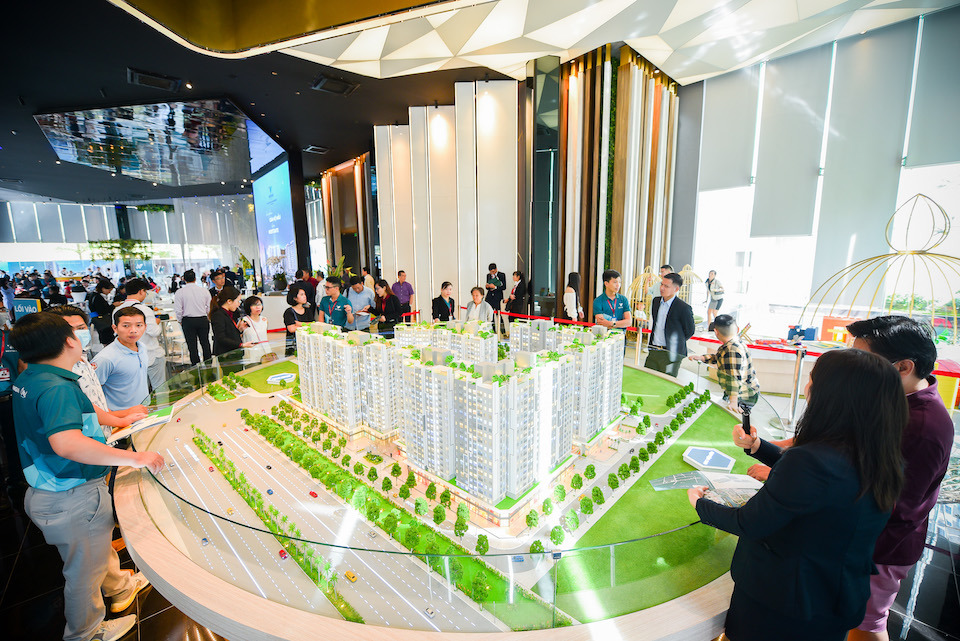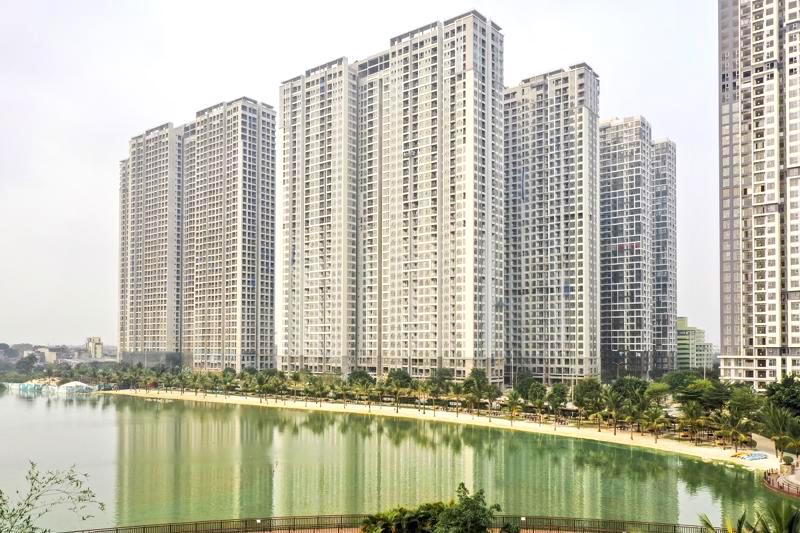Apartment prices in Hanoi are closing in on those in Ho Chi Minh City
The price of apartments in Hanoi has been on an upward trajectory, setting new price benchmarks.
Hanoi is witnessing the strongest surge in apartment prices in the past five years, with price increases ranging from 10% to 45% for most projects in 2023, according to local insiders.
| Local homebuyers attend the inauguration of a housing project. Photo: Tieu Thuy |
CBRE predicts that apartment prices in the city will be on course for further growth of between 16% and 24% this year.
The real estate research firm noted that in 2023 alone, the average primary sales price in Hanoi rose by nearly 15% annually, reaching VND53 million (US$2,117) per square meter. This level is equivalent to the average price in Ho Chi Minh City in 2020-2021.
In contrast, primary prices in Ho Chi Minh City remained above VND60 million ($2,396) per square meter in 2023, a decrease of almost 2% compared to 2022.
According to statistics provided by batdongsan.com.vn, after six years, the average price of condominiums in Hanoi has risen by 70%, surpassing Ho Chi Minh City, where the price of apartments has risen by only 55%
According to Dinh Minh Tuan, director of batdongsan.vn for the southern region, in the first quarter of 2024, the average price of apartments in Hanoi was VND46 million ($1,837) per square meter, while in Ho Chi Minh City it was VND48 million ($1,920). Previously, at the beginning of 2018, the listed prices of apartments in Hanoi and Ho Chi Minh City were VND27 million ($1,080) and VND31 million ($1,240) per square meter, respectively.
Following a long period of rising prices, current condominium prices in Hanoi are high and gradually approaching those in Ho Chi Minh City, Tuan said.
Apartments in Hanoi are set to rise by a substantial margin
| An apartment block in Hanoi. Photo: Masteri West Height |
Nguyen Quoc Anh, Deputy General Director of batdongsan.com.vn, explains the significant increase in the price of apartments in Hanoi on the grounds that the supply of apartments in Hanoi is still limited.
He added that despite measures taken to streamline legal procedures for developers, recent new projects have only released around 20,000 to 30,000 units per year. Meanwhile, demand is estimated at 70,000 to 80,000 units. This has led to a sharp rise in prices, according to Quoc Anh.
The local expert stressed that not only Hanoi residents and people from the northern provinces but also people from the south continue to show high demand for buying apartments in Hanoi. The interest of people from Ho Chi Minh City in buying apartments in Hanoi has increased 7.5 times since the first quarter of 2021.
Over the same period, the volume of searches for apartments in Ho Chi Minh City by Ho Chi Minh City residents has only doubled.
He believes that Ho Chi Minh City residents are increasingly interested in apartments in Hanoi due to the relatively stable and lower prices compared to Ho Chi Minh City. In addition, the return on investment for renting an apartment in Hanoi is much higher than in Ho Chi Minh City.
Apartment yields in Hanoi range from 4.1 to 4.9 percent, while yields in HCMC range from 3.9 to 4.5 percent.
There has also been a recent shift in the focus of some developers in the southern market to the north. Along with them, a large number of loyal investors from the southern region have also moved to Hanoi, which is a contributor to the increase in demand for apartments in Hanoi.
Similarly, Duong Thuy Dung, Senior Director of CBRE Vietnam, explains that the presence of property companies from the southern region, especially foreign developers, with improved project quality over the past two years has been a reason for the rise in property prices.
These include CapitaLand Development's high-end residential project Lumi Hanoi, Japan's Mitsubishi Corporation's partnership with Vinhomes on the Metropolitan project in the eastern part of the city, and Keppel Land's part of the Mailand Hanoi City project.
With a development lag of approximately three to five years compared to Ho Chi Minh City, the Hanoi market, particularly the residential segment, has been a lower priority for foreign developers entering Vietnam. However, these developers are now actively expanding into Hanoi to capture the new wave of market growth as the Ho Chi Minh City market has peaked with limited growth potential and experienced significant price increases.
According to Dung, Hanoi's relative affordability is one of the reasons why investors are attracted to the capital city. Comparing prices in the same mid-range product segment of similar quality, apartment prices in Ho Chi Minh City are about 30% higher than in Hanoi.
She believes that housing prices in Hanoi will continue to escalate until they become prohibitively expensive for homebuyers. At that point, the pace of price growth will slow, mirroring the current situation in Ho Chi Minh City.
She added that another differentiating and crucial factor contributing to the strong price increase of apartments in Hanoi is the development of the infrastructure system.
In recent years, Hanoi's transport infrastructure has developed rapidly and significantly better than that of Ho Chi Minh City. The development of the transport infrastructure network has facilitated convenient connectivity and travel between suburban areas and the city center.
For example, residents who buy houses in the Gia Lam district now only need about 45 minutes to commute to the city center.
In Ho Chi Minh City, on the other hand, residents have to travel 1.5 to 2 hours for a similar distance. This explains the recent sharp rise in the price of suburban apartments in Hanoi, Dung said.











